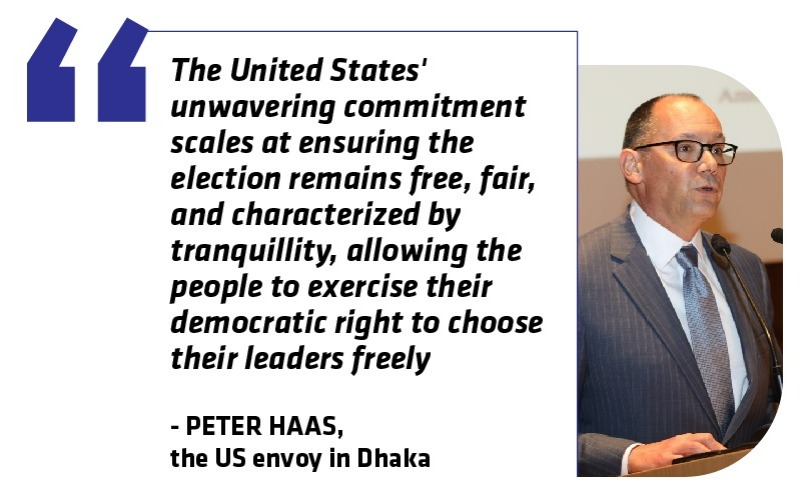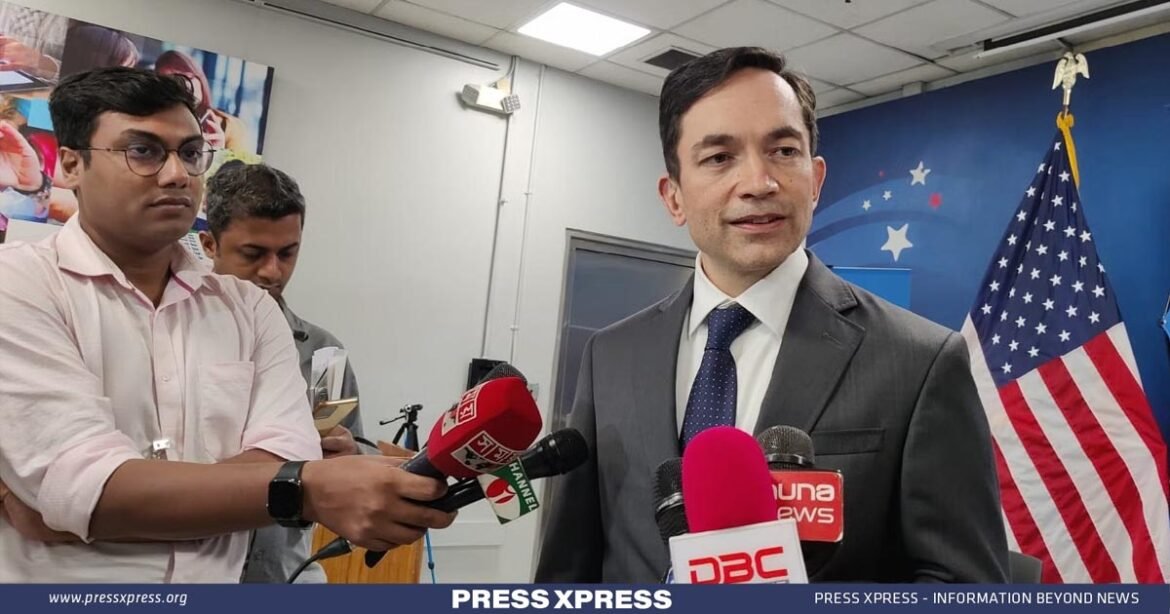The International Republican Institute (IRI) and the National Democratic Institute (NDI), backed by funding from the United States government, shall dispatch an autonomous Pre-Election Assessment Mission (PEAM) to Bangladesh.
In a momentous revelation, Bryan Schiller, the spokesperson for the US embassy, unveiled that a cadre of six delegates will embark on a mission to Bangladesh from the 7th to the 13th of October. This announcement was made during a momentous gathering at the American Centre in Dhaka on Thursday, September 21, 2023. The program was orchestrated to extend a warm welcome to the newly appointed mission director of the United States Agency for International Development (USAID) in Bangladesh, Reed Aeschliman.
Engaging Bangladesh’s diverse stakeholders in election assessment
In response to a question regarding the US’s stance on supporting Bangladesh in its development endeavors in the event of an election, Aeschliman conveyed unequivocally that the United States ardently aspires to witness a democratic spectacle in Bangladesh. This regards a country that adheres unerringly to international norms and garners unanimous approval within the nation’s borders. This, he stressed, was the official position of the US government. He further elucidated that the role of the United States is not to advocate for the participation of specific individuals or political factions. Rather, the US works to bolster the institutional capabilities ensuring the fairness and impartiality of the electoral process. The United States is disinterested in the electoral outcome, with its laser focus trained on enhancing the institutional fabric.
You Can Also Read: CEC ISSUES STERN WARNING: NO ROOM FOR BIAS IN ELECTIONS
Aeschliman reaffirmed the deep-rooted partnership between the US and Bangladesh, spanning over half a century. This partnership, he emphasized, continues to flourish in realms such as agriculture, food security, environmental stewardship, climate change mitigation, trade, and the thriving readymade garments industry, a relationship set to burgeon further in the days ahead.
The US embassy spokesperson disclosed that the PEAM delegation would engage in dialogue with a diverse array of stakeholders. This engagement will encompass the Bangladesh Election Commission, various government bodies, political entities, civil watchdogs, as well as women’s and youth organizations. Furthermore, the delegates shall interface with both local and international media outlets and representatives of foreign diplomatic missions ensconced in Bangladesh.
Upon the culmination of their mission, the delegation will issue a public statement, articulating any apprehensions they may harbor regarding the election process. Upon their return to Washington DC, they shall share their insights with international stakeholders and policymakers.
Haas’ blueprint for US-Bangladesh collaboration

Speaking at an event in the city, Peter Haas, the US envoy in Dhaka, emphasized the United States’ unwavering commitment to bolstering the upcoming national election in Bangladesh. This commitment scales at ensuring the election remains free, fair, and characterized by tranquillity, allowing the people to exercise their democratic right to choose their leaders freely.
Peter Haas, in his capacity as the U.S. Ambassador to Bangladesh, reiterated his dedication to nurturing the bilateral partnership between the United States and Bangladesh, aimed at confronting shared challenges head-on. He elucidated that peace flourishes in an environment where nations can independently chart their course and forge alliances. This will ultimately result in enabling each country’s populace to freely elect its leadership, he said.
He went on to emphasize the paramount importance of respecting sovereignty. He also focused on ensuring that every nation possesses the autonomy to make decisions aligning with its best interests. Both the United States and Bangladesh, he affirmed, ardently champion this commitment. He added that both these countries are advocating for a world where the choices of all nations are not only respected but also supported.
Haas articulated a shared vision of economic well-being for all citizens, manifesting through trade, investment, and development cooperation. He highlighted the United States’ role as one of the largest sources of foreign direct investment in Bangladesh. In fact, the authority pledges to work collaboratively to create an attractive investment climate and facilitate U.S. investors’ entry into new sectors, ultimately benefiting both nations’ populations.
A strong front for regional security
Addressing bilateral cooperation for safeguarding regional security and stability, the envoy stressed the United States and Bangladesh’s joint commitment to regional security. He outlined how the United States provides training and equipment, often at minimal or no cost, to Bangladesh’s security services, including the armed forces and Coast Guard. Examples cited encompassed high-speed Metal Shark Boats and unmanned aerial systems (UAS), which bolster Bangladesh’s capabilities in safeguarding its sovereignty against various challenges. These also include violent extremism, cross-border drug trafficking, and illegal, unreported, and unregulated fishing in the Bay of Bengal—a practice that negatively impacts Bangladeshi fishermen and the national food supply.
Peter Haas noted that the bond between the United States and Bangladesh transcends governmental ties, as it bridges the hearts of their respective populations. Educational and exchange opportunities are playing a pivotal role in deepening these connections between the American and Bangladeshi people.


